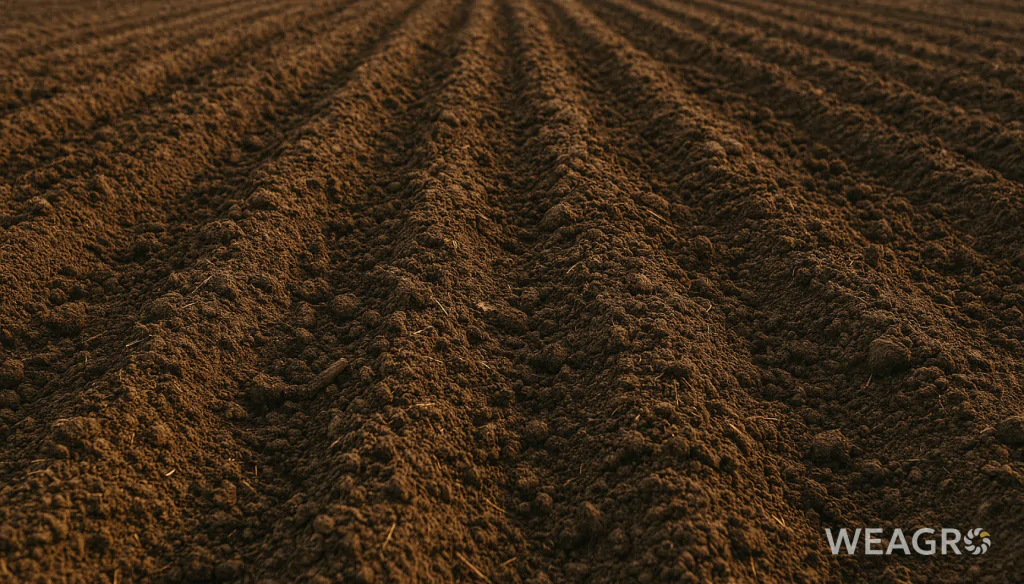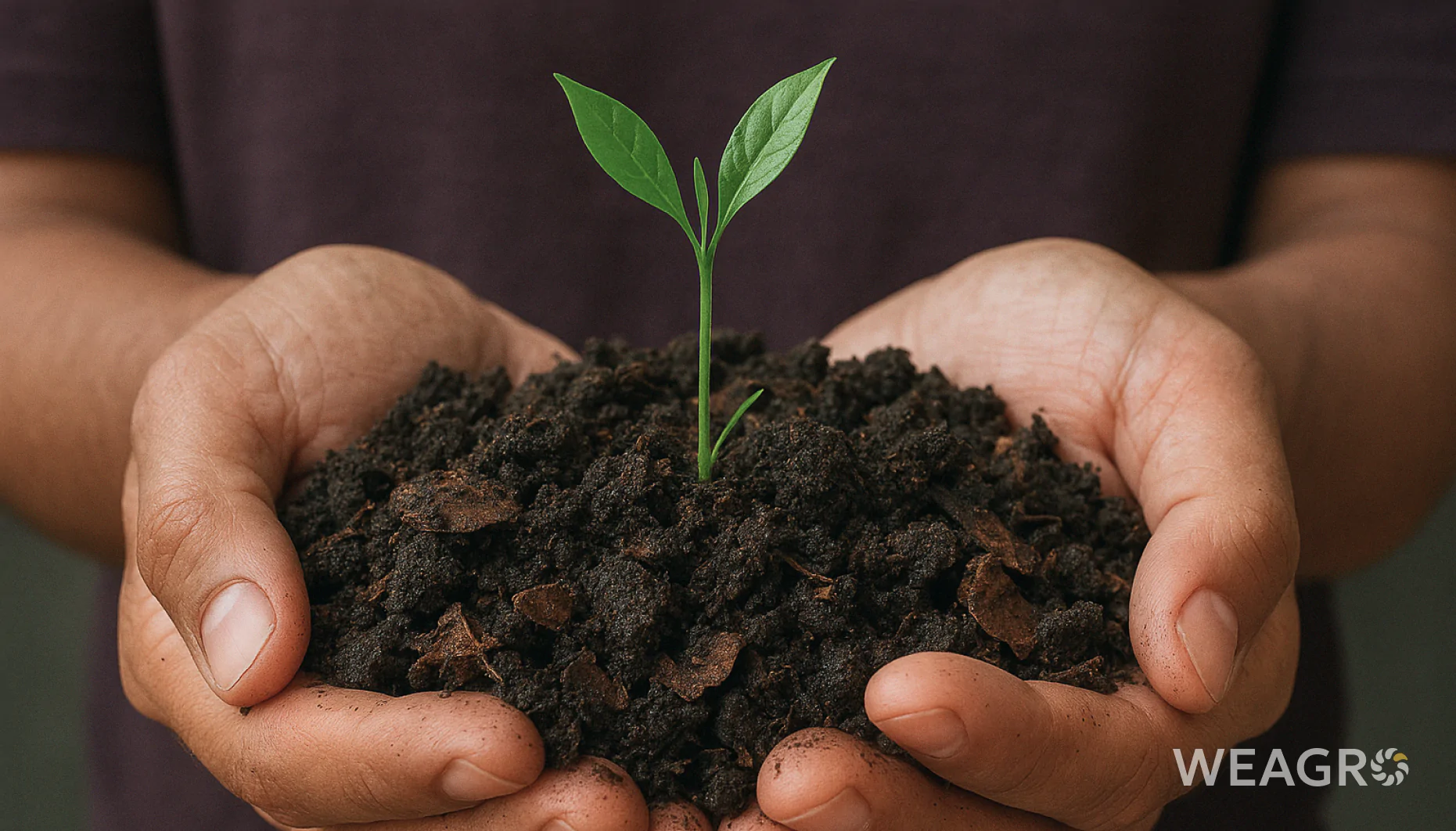Biochar is an organic material obtained through thermal processing of biomass in the absence of oxygen. This product has unique properties that make it valuable for agricultural use. In this article, we’ll examine what biochar is, how it’s produced, where it’s used, and what benefits it provides for soil and plants.
What is Biochar

Biochar is a carbon product formed through the pyrolysis of organic plant or animal-based raw materials. During this process, biomass is heated to high temperatures (300-700°C) in the absence of oxygen. Under these conditions, organic matter decomposes to form biochar, pyrolysis liquid, and synthesis gas.
The production process can be divided into several stages:
- Raw material preparation. Grinding biomass into uniform fraction, drying to 10-20% moisture content.
- Loading into the pyrolysis reactor and heating in the absence of oxygen. This causes thermal decomposition of organic matter, forming solid residue, liquid products (tars), and combustible gases.
- Cooling the obtained biochar and unloading it from the reactor. At this stage, it’s important to prevent biochar self-ignition when it contacts air.
- Grinding and sieving to the required fraction (usually 1-10 mm), packaging, and storage.
Depending on the raw material type, technology, and pyrolysis parameters, the yield can range from 20% to 50% of the loaded biomass. The material retains 50-80% of the carbon contained in the original base.
Raw materials for production can include:
- agricultural and forestry waste (straw, husks, sawdust, branches);
- energy crops (miscanthus, switchgrass);
- food waste;
- manure, animal droppings.
Interestingly, in ancient times, the material was formed during forest burning and was used to increase soil fertility 2,000 years ago in the Amazon basin. There are still areas of extremely fertile layers called Terra Preta, containing 15-20% biochar.
Depending on the raw materials and pyrolysis parameters, the material can contain 50-90% carbon, as well as phosphorus, potassium, calcium, magnesium, and other plant-beneficial elements. Ash content is usually 1-5% but can reach 15-20% for some types of biomass (such as chicken manure).
The key characteristics that determine the quality and suitability of the material for agricultural use are:
- Carbon content. The higher, the better, as it indicates high biochar resistance to decomposition.
- Specific surface area. Determines the material’s ability to retain water and nutrients. Quality base can have a surface area of 300-500 m²/g.
- Porosity. The presence of a developed system of pores of different sizes allows biochar to absorb and retain moisture, serving as a medium for microorganism development.
- pH. The material usually has an alkaline reaction (pH 7-10), allowing it to be used for reducing soil acidity.
- Ash content. Low ash content (up to 5%) is desirable, as ash contains soluble salts that can salinize soil.
- Toxic substance content. Heavy metals and organic pollutants from the raw materials accumulate in the material. Therefore, using clean raw materials is critical for producing quality and safe base.
Overall, biochar is a unique product that combines the properties of organic matter and mineral sorbents. Thanks to its porous structure and high stable carbon content, biochar can improve soil fertility and provide long-term agronomic effects.
Read also: Soil: What It Is, Types, and Its Fertility
Use of Biochar in Agriculture
Biochar finds diverse applications in agriculture due to its beneficial properties. Here are the main areas where biochar provides positive effects.
| Application Area | Effect of Biochar Use |
| Soil Fertilization | Improves structure, increases water and air permeability, increases cation exchange capacity |
| Plant Nutrition | Gradually releases nutrients, promotes root system development |
| Soil Reclamation | Reduces acidity, removes toxic substances, increases biological activity |
| Erosion Control | Retains moisture, binds soil particles, prevents weathering and washout |
| Composting | Accelerates organic matter decomposition, reduces nitrogen losses, absorbs odors |
| Animal Feed | Improves feed absorption, reduces methane emissions, adsorbs toxins |
Thanks to such a wide spectrum of action, biochar is a universal tool for increasing the efficiency of crop and livestock production.
To obtain biochar for their needs, agricultural producers can use installment payments from our online service WEAGRO. This allows purchasing the necessary amount of biochar now and spreading the payment over a convenient period. Details about agricultural installment terms can be found on the website.
Benefits of Using Biochar in Agriculture
Systematic application of the material to soil provides several environmental and economic benefits:
- increasing crop yields by 10-30% through optimized nutrition and root system development;
- restoring fertility of degraded soils, increasing humus content and beneficial microflora;
- reducing the need for mineral fertilizers, saving costs on their purchase;
- improving soil’s ability to retain moisture, reducing irrigation needs;
- reducing nitrous oxide and methane emissions from soil, mitigating climate change;
- long-term carbon storage, making the material an effective decarbonization tool.
Potential risks include the possibility of introducing contaminants when using poor-quality raw materials and the incompatibility of certain biochar types with specific soil types. Therefore, it’s important to use verified material and consult with specialists.
Use of Biochar in Ukraine

In Ukraine, the technology of biochar production and application is just beginning to develop. According to a study conducted in 2021-2023, the actual volume of biochar production in our country remains minimal as the market is not yet formed. At the same time, the potential for developing this direction is estimated extremely high – over 8.5 million tons per year in production capabilities, while demand in various sectors, including agriculture, metallurgy, and energy, could exceed 40 million tons annually.
The main limiting factors for the development of biochar production and use in Ukraine are:
- Insufficient awareness among agricultural producers about the benefits and specifics of material use. Many farmers simply don’t know about the existence of such technology or have misconceptions about its effectiveness and safety.
- Lack of state support and incentives for implementing production technologies. Unlike EU countries, where subsidy programs and grant funding for biochar production projects exist, such mechanisms are not provided in Ukraine.
- Lack of local capacity for industrial production. As of 2021, only a few small enterprises producing biochar operated in Ukraine. Their capacity doesn’t allow meeting the potential demand for the product.
- High cost of imported production equipment, which restrains investments in this sector. Ukrainian companies are forced to purchase expensive equipment abroad, significantly increasing the final product cost.
- Lack of quality standards harmonized with European norms. This creates risks of poor-quality or unsafe products entering the market.
Read also: Energy-Saving and Resource-Saving Technologies in Agriculture
Overcoming these barriers requires coordinated efforts from the state, business, and scientific community. It’s necessary to conduct a broad information campaign among agricultural producers about the benefits of using biochar, implement biochar production support programs, stimulate investments in capacity creation, develop and integrate product quality standards.
A positive signal is that more and more Ukrainian agricultural companies are interested in the possibilities of using the material in their activities. In particular, biochar is used by organic farms to increase soil fertility without synthetic fertilizers. Biochar is also used for reclamation of degraded lands, particularly those released from industrial assets – quarries, dumps, landfills.
The development of production in Ukraine will be facilitated by the introduction of a national carbon market and greenhouse gas emission quota trading system. Under such conditions, biochar production as a carbon sorbent will become economically attractive and allow agricultural companies to receive additional income from carbon unit sales.
Agricultural producers interested in testing biochar on their fields can take advantage of our online service WEAGRO. A unique agricultural installment service is offered for purchasing biochar and other resources necessary for effective agricultural activities.









